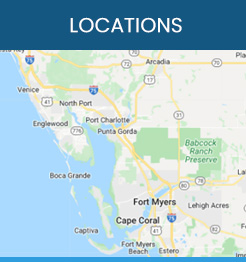Do You Have Arthritis in Your Hands?
If caught in the early stages, arthritis in the hand and fingers can be treated. Early intervention delays further joint damage and preserves your ability to use your hand. For more information, please contact us. We have convenient locations in Fort Myers, FL and Port Charlotte, FL to serve you.
Arthritis can develop in any joint, including the small joints of the hand and fingers. These joints enable our hands and fingers to perform fine tasks such as threading a needle, thanks to an intricate network of articular cartilage and an oil-like substance called synovial fluid which allows the bones of the joint to move smoothly.
However, if years of use break down the cartilage or if the cartilage becomes inflamed, patient may develop small joint arthritis in the fingers. According to the Arthritis Foundation, 54 million adults in the U.S. have been diagnosed with arthritis, with osteoarthritis the most common form.
Osteoarthritis is a degenerative disease that progressively wears away the cartilage. It’s most often diagnosed in older people. Another common type of arthritis is rheumatoid arthritis, which is an inflammation in the joint. Rheumatoid arthritis usually affects the small joints in the hands and feet. It’s important to know the early signs of both kinds of arthritis, as early detection and treatment is key to keeping your hands working and pain-free.
Early Signs of Arthritis
As soon as you experience symptoms of arthritis in the hand, seek medical intervention. Early intervention slows the progression of the disease and prevents further joint erosion. You’re most likely to notice these characteristics of arthritis in the hand and fingers first:
- Pain. Arthritis pain typically starts as a dull ache or burning sensation that’s especially noticeable after you’ve grabbed or twisted with your hand. You might not feel the pain immediately after the task, but rather upon waking up the next morning. Humid or rainy weather sometimes intensifies the pain.
- Swelling. Arthritic joints frequently swell because of an excess of synovial fluid or inflammation. This restricts your range of motion, which may be the body’s way of preventing more damage to the joint by overuse.
- Cyst. Arthritis in the end joints of the fingers may give rise to small cysts that cause ridges or dents in the nail of the affected finger.
An orthopedic doctor can diagnose arthritis in the hand with a physical examination or an X-ray. These tests can help rule other causes of hand pain, such as carpal tunnel syndrome or tendonitis.
In the early stages, treatment centers around pain management with anti-inflammatory medications. Anti-inflammatory, nonsteroidal drugs also reduce inflammation if you have rheumatoid arthritis.
In addition, an injection of an anesthetic can provide pain relief for weeks, and putting the hand in a splint can also offer weeks of relief by keeping the hand immobile. Splints should only be worn when the hand is painful because immobilizing the hand for too long may atrophy the muscles around the joint.
You may also try some at-home remedies to ease the pain of hand arthritis. Applying heat to the joint loosens stiff joint joints, while icing reduces inflammation and swelling. A hand therapist can also show you ways to do everyday tasks without putting added stress on the joint.
Dietary supplements such as glucosamine and chondroitin are widely touted as cartilage-building aids, but have yet to be scientifically examined as a therapy for hand and finger arthritis. These solutions may not mix well with other medications, so always check with your doctor before taking them.
If conservative treatments aren’t successful or you suffer from severe pain, surgery may be recommended. In those cases, a joint fusion or joint replacement can reduce pain and restore function to the fingers and hand.
Visit a Hand Specialist
Arthritis in the hand progresses so slowly you might not be aware of the condition in its earliest stages — but as soon as you experience the first signs of arthritis in the hand or fingers, you should visit a hand specialist. The doctors at Florida Hand Center can detail a treatment plan that will maintain your joint health for many years. Call our office today for an appointment.







